
az-hop
The Azure HPC On-Demand Platform provides an HPC Cluster Ready solution
Stars: 63
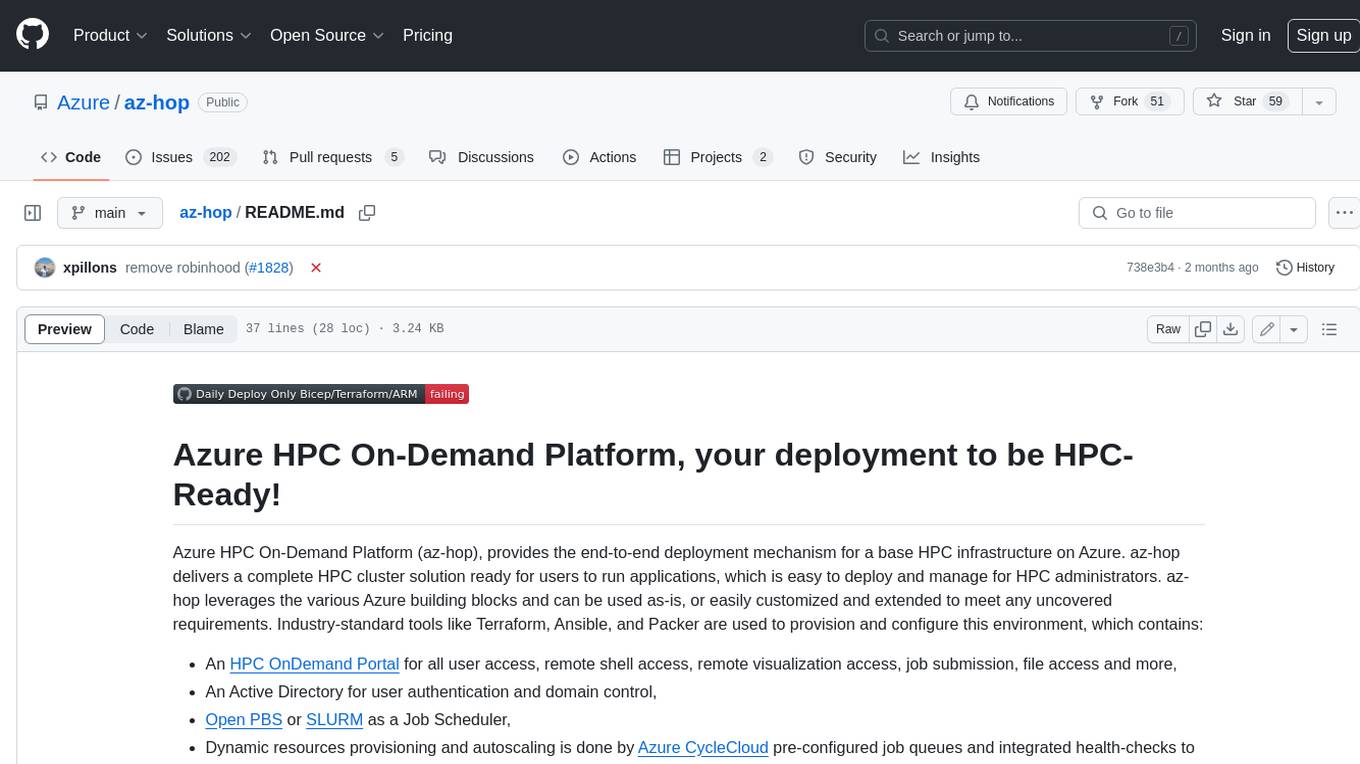
Azure HPC On-Demand Platform (az-hop) provides an end-to-end deployment mechanism for a base HPC infrastructure on Azure. It delivers a complete HPC cluster solution ready for users to run applications, which is easy to deploy and manage for HPC administrators. az-hop leverages various Azure building blocks and can be used as-is or easily customized and extended to meet any uncovered requirements. Industry-standard tools like Terraform, Ansible, and Packer are used to provision and configure this environment, which contains: - An HPC OnDemand Portal for all user access, remote shell access, remote visualization access, job submission, file access, and more - An Active Directory for user authentication and domain control - Open PBS or SLURM as a Job Scheduler - Dynamic resources provisioning and autoscaling is done by Azure CycleCloud pre-configured job queues and integrated health-checks to quickly avoid non-optimal nodes - A Jumpbox to provide admin access - A common shared file system for home directory and applications is delivered by Azure Netapp Files - Grafana dashboards to monitor your cluster - Remote Visualization with noVNC and GPU acceleration with VirtualGL
README:
Azure HPC On-Demand Platform (az-hop), provides the end-to-end deployment mechanism for a base HPC infrastructure on Azure. az-hop delivers a complete HPC cluster solution ready for users to run applications, which is easy to deploy and manage for HPC administrators. az-hop leverages the various Azure building blocks and can be used as-is, or easily customized and extended to meet any uncovered requirements. Industry-standard tools like Terraform, Ansible, and Packer are used to provision and configure this environment, which contains:
- An HPC OnDemand Portal for all user access, remote shell access, remote visualization access, job submission, file access and more,
- An Active Directory for user authentication and domain control,
- Open PBS or SLURM as a Job Scheduler,
- Dynamic resources provisioning and autoscaling is done by Azure CycleCloud pre-configured job queues and integrated health-checks to quickly avoid non-optimal nodes,
- A Jumpbox to provide admin access,
- A common shared file system for home directory and applications is delivered by Azure Netapp Files,
- Grafana dashboards to monitor your cluster,
- Remote Visualization with noVNC and GPU acceleration with VirtualGL.
Please check the whole azhop documentation here.
This project welcomes contributions and suggestions. Most contributions require you to agree to a Contributor License Agreement (CLA) declaring that you have the right to, and actually do, grant us the rights to use your contribution. For details, visit https://cla.opensource.microsoft.com.
When you submit a pull request, a CLA bot will automatically determine whether you need to provide a CLA and decorate the PR appropriately (e.g., status check, comment). Simply follow the instructions provided by the bot. You will only need to do this once across all repos using our CLA.
This project has adopted the Microsoft Open Source Code of Conduct. For more information see the Code of Conduct FAQ or contact [email protected] with any additional questions or comments.
This project may contain trademarks or logos for projects, products, or services. Authorized use of Microsoft trademarks or logos is subject to and must follow Microsoft's Trademark & Brand Guidelines. Use of Microsoft trademarks or logos in modified versions of this project must not cause confusion or imply Microsoft sponsorship. Any use of third-party trademarks or logos are subject to those third-party's policies.
For Tasks:
Click tags to check more tools for each tasksFor Jobs:
Alternative AI tools for az-hop
Similar Open Source Tools

az-hop
Azure HPC On-Demand Platform (az-hop) provides an end-to-end deployment mechanism for a base HPC infrastructure on Azure. It delivers a complete HPC cluster solution ready for users to run applications, which is easy to deploy and manage for HPC administrators. az-hop leverages various Azure building blocks and can be used as-is or easily customized and extended to meet any uncovered requirements. Industry-standard tools like Terraform, Ansible, and Packer are used to provision and configure this environment, which contains: - An HPC OnDemand Portal for all user access, remote shell access, remote visualization access, job submission, file access, and more - An Active Directory for user authentication and domain control - Open PBS or SLURM as a Job Scheduler - Dynamic resources provisioning and autoscaling is done by Azure CycleCloud pre-configured job queues and integrated health-checks to quickly avoid non-optimal nodes - A Jumpbox to provide admin access - A common shared file system for home directory and applications is delivered by Azure Netapp Files - Grafana dashboards to monitor your cluster - Remote Visualization with noVNC and GPU acceleration with VirtualGL
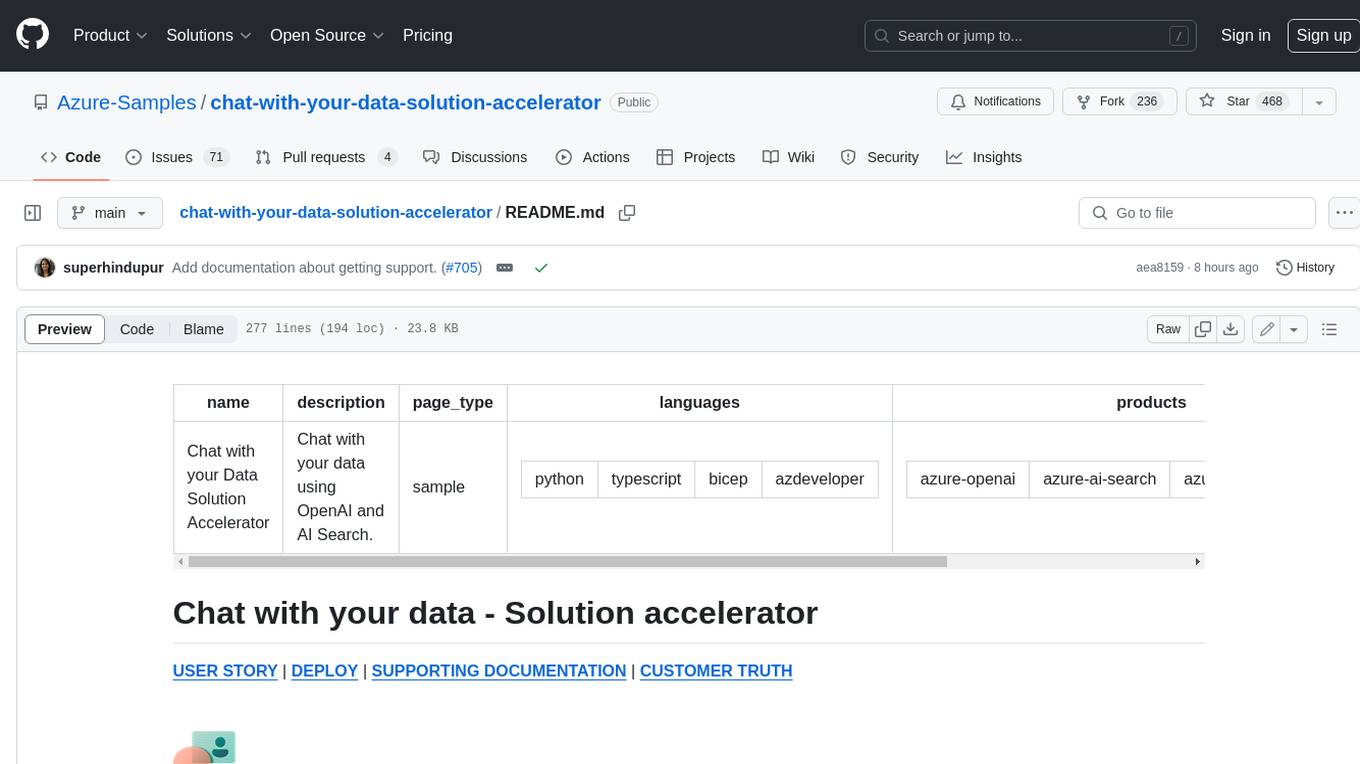
chat-with-your-data-solution-accelerator
Chat with your data using OpenAI and AI Search. This solution accelerator uses an Azure OpenAI GPT model and an Azure AI Search index generated from your data, which is integrated into a web application to provide a natural language interface, including speech-to-text functionality, for search queries. Users can drag and drop files, point to storage, and take care of technical setup to transform documents. There is a web app that users can create in their own subscription with security and authentication.
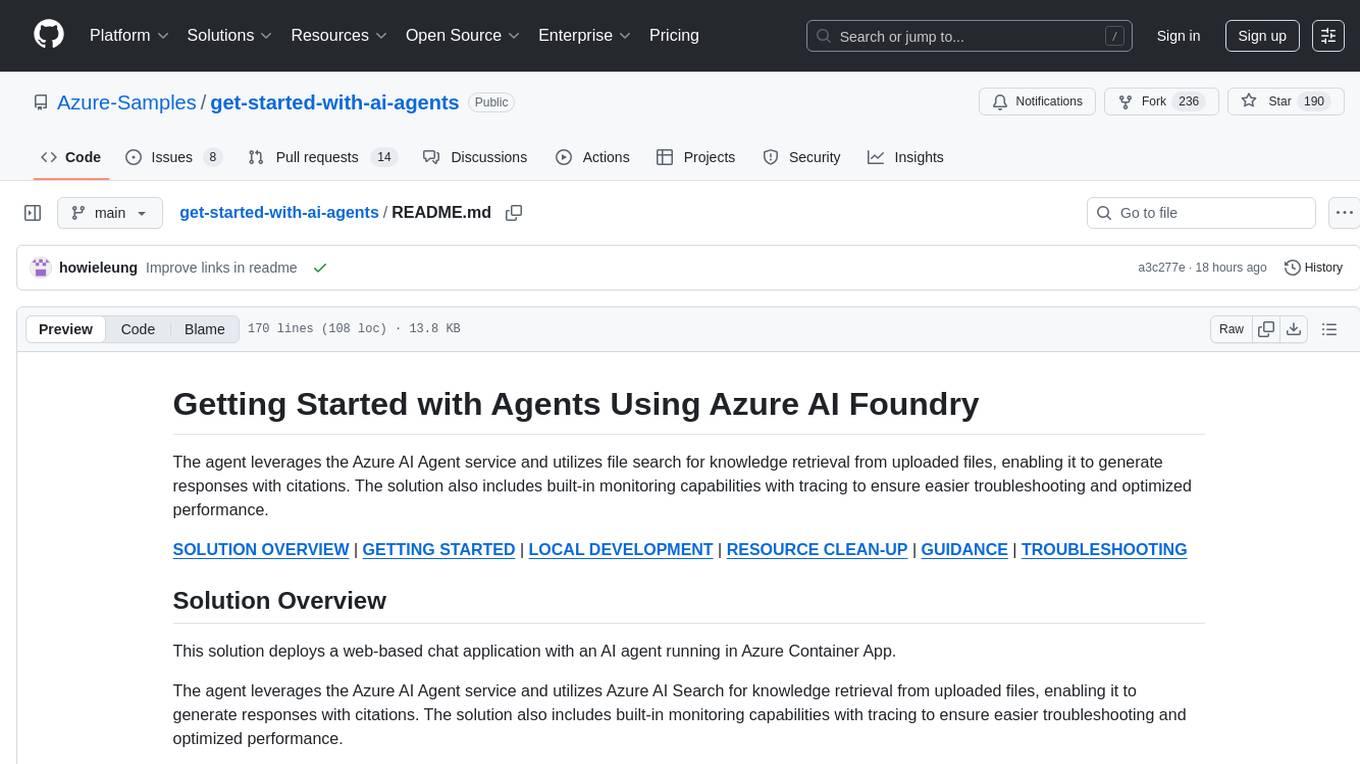
get-started-with-ai-agents
The 'Getting Started with Agents Using Azure AI Foundry' repository provides a solution that deploys a web-based chat application with an AI agent running in Azure Container App. The agent leverages Azure AI services for knowledge retrieval from uploaded files, enabling it to generate responses with citations. The solution includes built-in monitoring capabilities for easier troubleshooting and optimized performance. Users can deploy AI models, customize the agent, and evaluate its performance. The repository offers flexible deployment options through GitHub Codespaces, VS Code Dev Containers, or local environments.
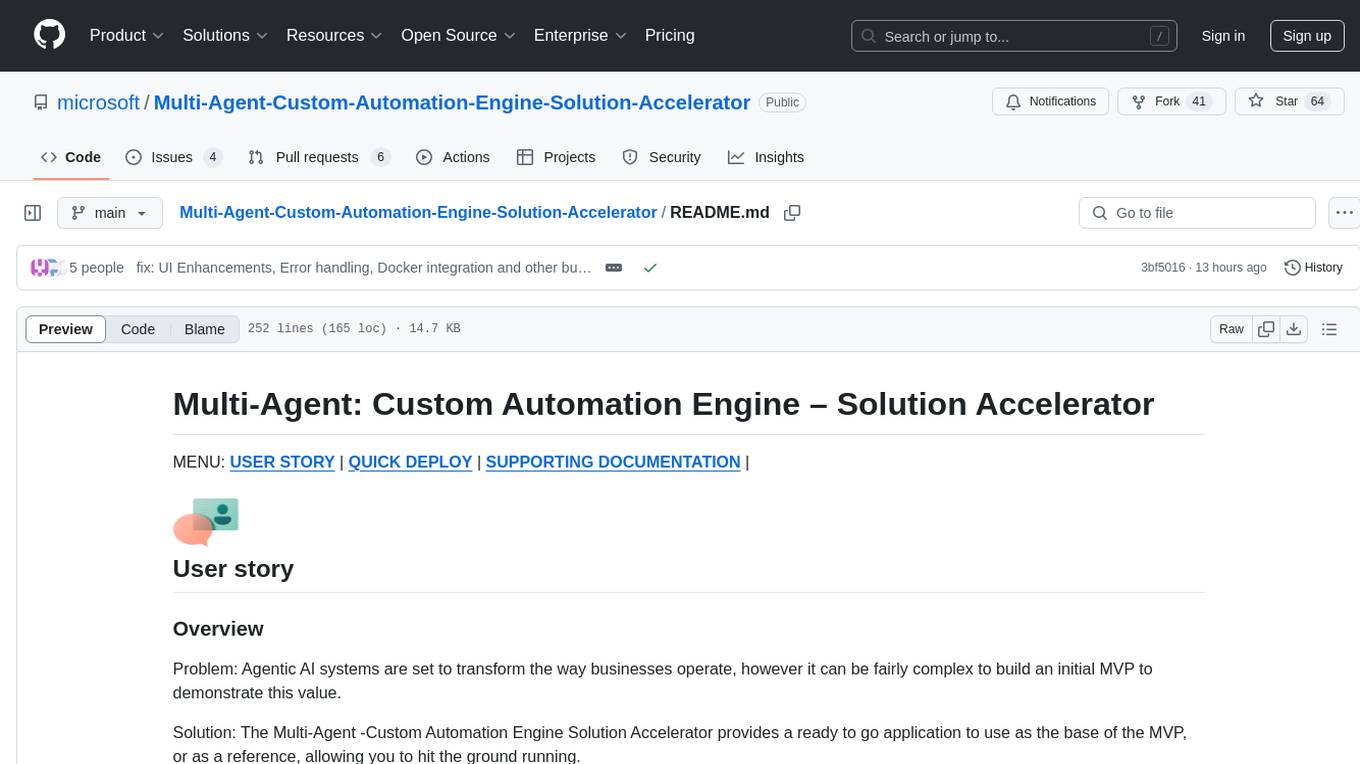
Multi-Agent-Custom-Automation-Engine-Solution-Accelerator
The Multi-Agent -Custom Automation Engine Solution Accelerator is an AI-driven orchestration system that manages a group of AI agents to accomplish tasks based on user input. It uses a FastAPI backend to handle HTTP requests, processes them through various specialized agents, and stores stateful information using Azure Cosmos DB. The system allows users to focus on what matters by coordinating activities across an organization, enabling GenAI to scale, and is applicable to most industries. It is intended for developing and deploying custom AI solutions for specific customers, providing a foundation to accelerate building out multi-agent systems.
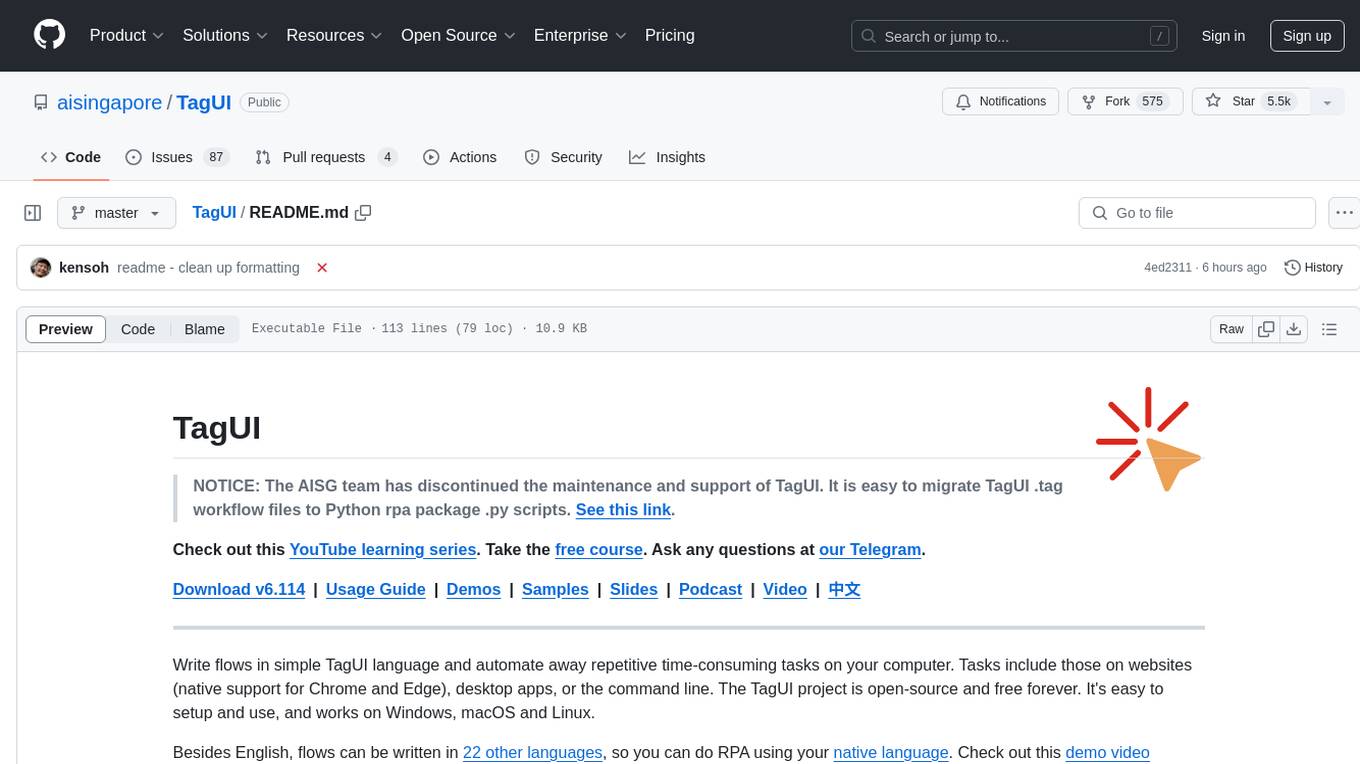
TagUI
TagUI is an open-source RPA tool that allows users to automate repetitive tasks on their computer, including tasks on websites, desktop apps, and the command line. It supports multiple languages and offers features like interacting with identifiers, automating data collection, moving data between TagUI and Excel, and sending Telegram notifications. Users can create RPA robots using MS Office Plug-ins or text editors, run TagUI on the cloud, and integrate with other RPA tools. TagUI prioritizes enterprise security by running on users' computers and not storing data. It offers detailed logs, enterprise installation guides, and support for centralised reporting.
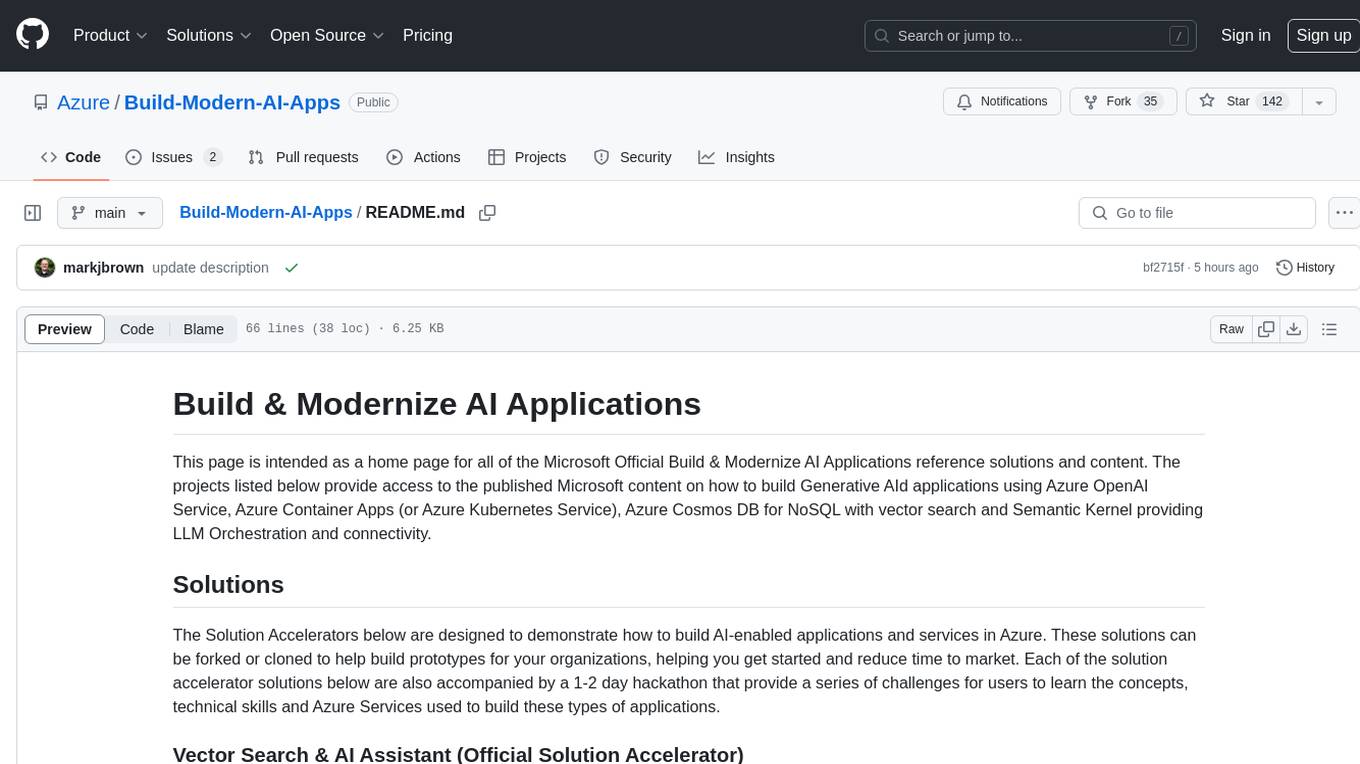
Build-Modern-AI-Apps
This repository serves as a hub for Microsoft Official Build & Modernize AI Applications reference solutions and content. It provides access to projects demonstrating how to build Generative AI applications using Azure services like Azure OpenAI, Azure Container Apps, Azure Kubernetes, and Azure Cosmos DB. The solutions include Vector Search & AI Assistant, Real-Time Payment and Transaction Processing, and Medical Claims Processing. Additionally, there are workshops like the Intelligent App Workshop for Microsoft Copilot Stack, focusing on infusing intelligence into traditional software systems using foundation models and design thinking.
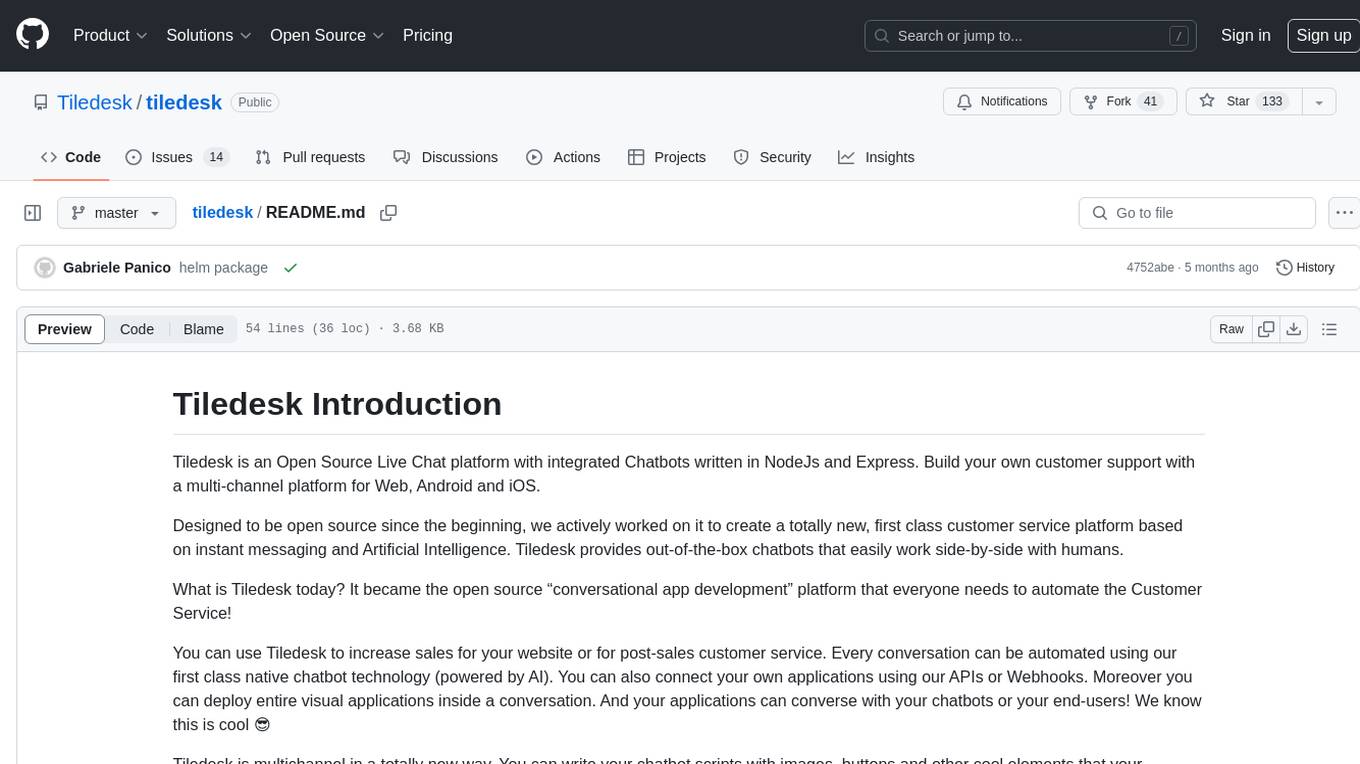
tiledesk
Tiledesk is an Open Source Live Chat platform with integrated Chatbots written in NodeJs and Express. It provides a multi-channel platform for Web, Android, and iOS, offering out-of-the-box chatbots that work alongside humans. Users can automate conversations using native chatbot technology powered by AI, connect applications via APIs or Webhooks, deploy visual applications within conversations, and enable applications to interact with chatbots or end-users. Tiledesk is multichannel, allowing chatbot scripts with images and buttons to run on various channels like Whatsapp, Facebook Messenger, and Telegram. The project includes Tiledesk Server, Dashboard, Design Studio, Chat21 ionic, Web Widget, Server, Http Server, MongoDB, and a proxy. It offers Helm charts for Kubernetes deployment, but customization is recommended for production environments, such as integrating with external MongoDB or monitoring/logging tools. Enterprise customers can request private Docker images by contacting [email protected].
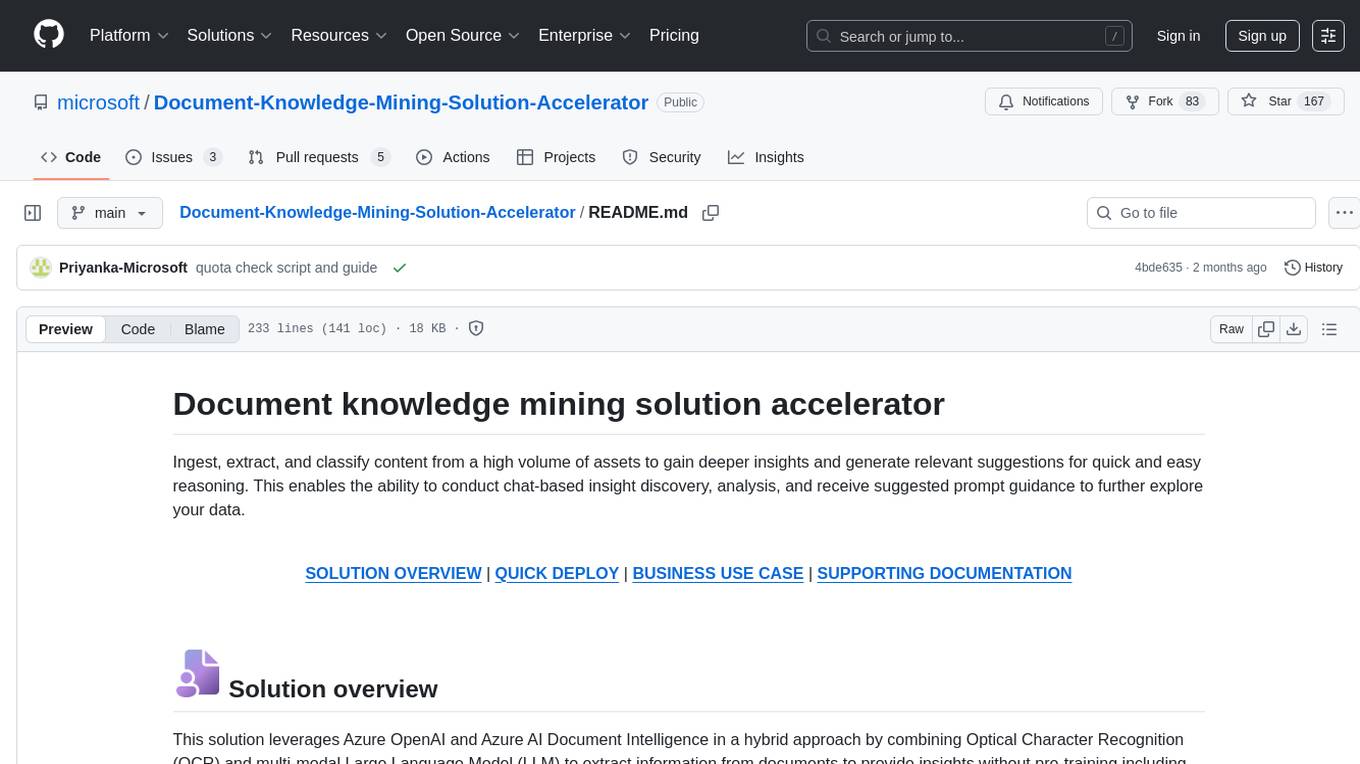
Document-Knowledge-Mining-Solution-Accelerator
The Document Knowledge Mining Solution Accelerator leverages Azure OpenAI and Azure AI Document Intelligence to ingest, extract, and classify content from various assets, enabling chat-based insight discovery, analysis, and prompt guidance. It uses OCR and multi-modal LLM to extract information from documents like text, handwritten text, charts, graphs, tables, and form fields. Users can customize the technical architecture and data processing workflow. Key features include ingesting and extracting real-world entities, chat-based insights discovery, text and document data analysis, prompt suggestion guidance, and multi-modal information processing.
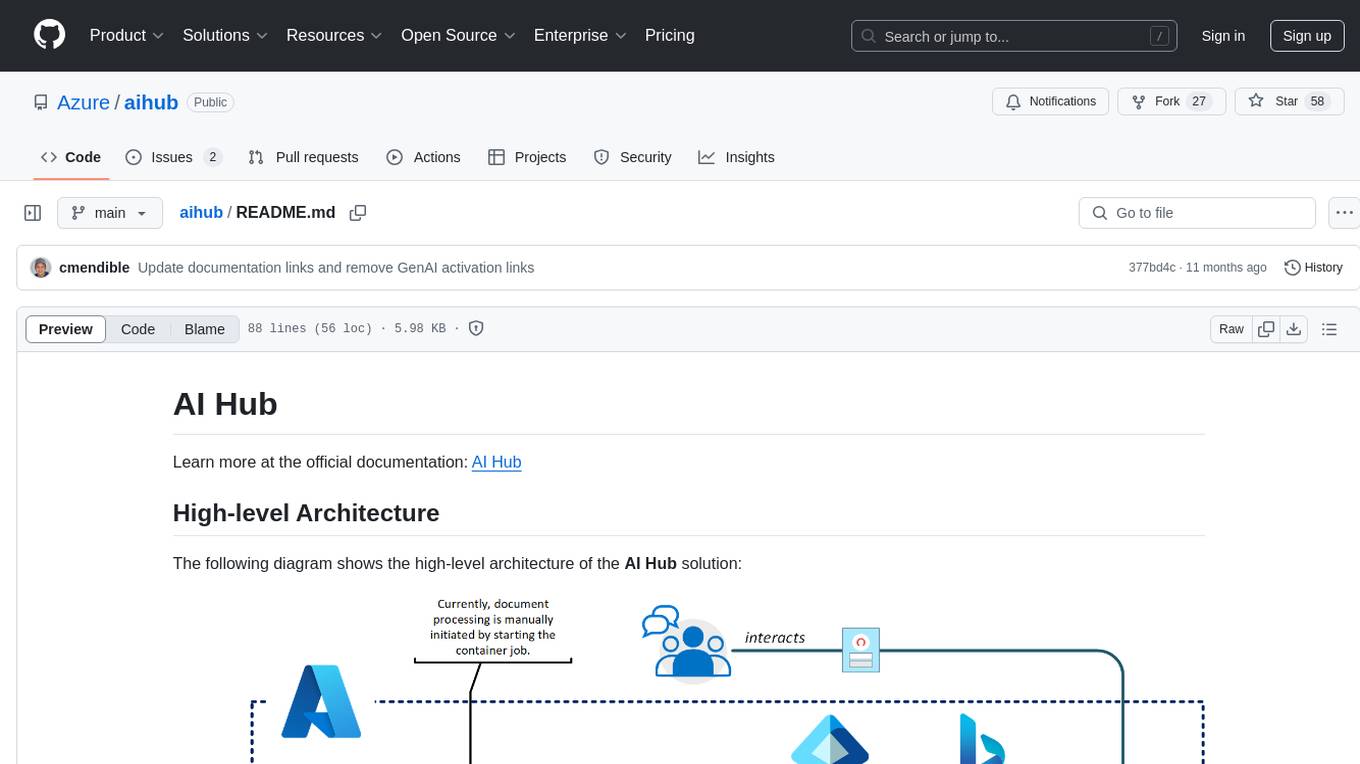
aihub
AI Hub is a comprehensive solution that leverages artificial intelligence and cloud computing to provide functionalities such as document search and retrieval, call center analytics, image analysis, brand reputation analysis, form analysis, document comparison, and content safety moderation. It integrates various Azure services like Cognitive Search, ChatGPT, Azure Vision Services, and Azure Document Intelligence to offer scalable, extensible, and secure AI-powered capabilities for different use cases and scenarios.
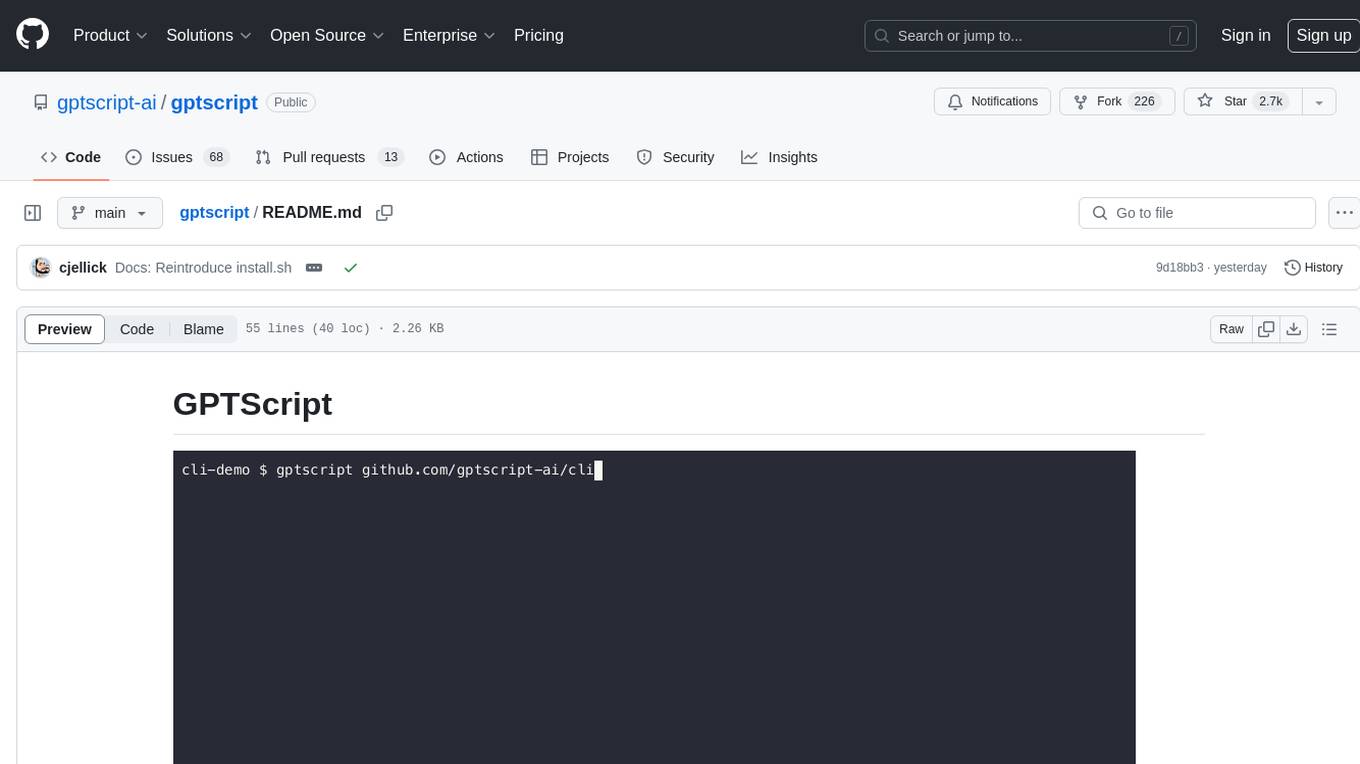
gptscript
GPTScript is a framework that enables Large Language Models (LLMs) to interact with various systems, including local executables, applications with OpenAPI schemas, SDK libraries, or RAG-based solutions. It simplifies the integration of systems with LLMs using minimal prompts. Sample use cases include chatting with a local CLI, OpenAPI compliant endpoint, local files/directories, and running automated workflows.
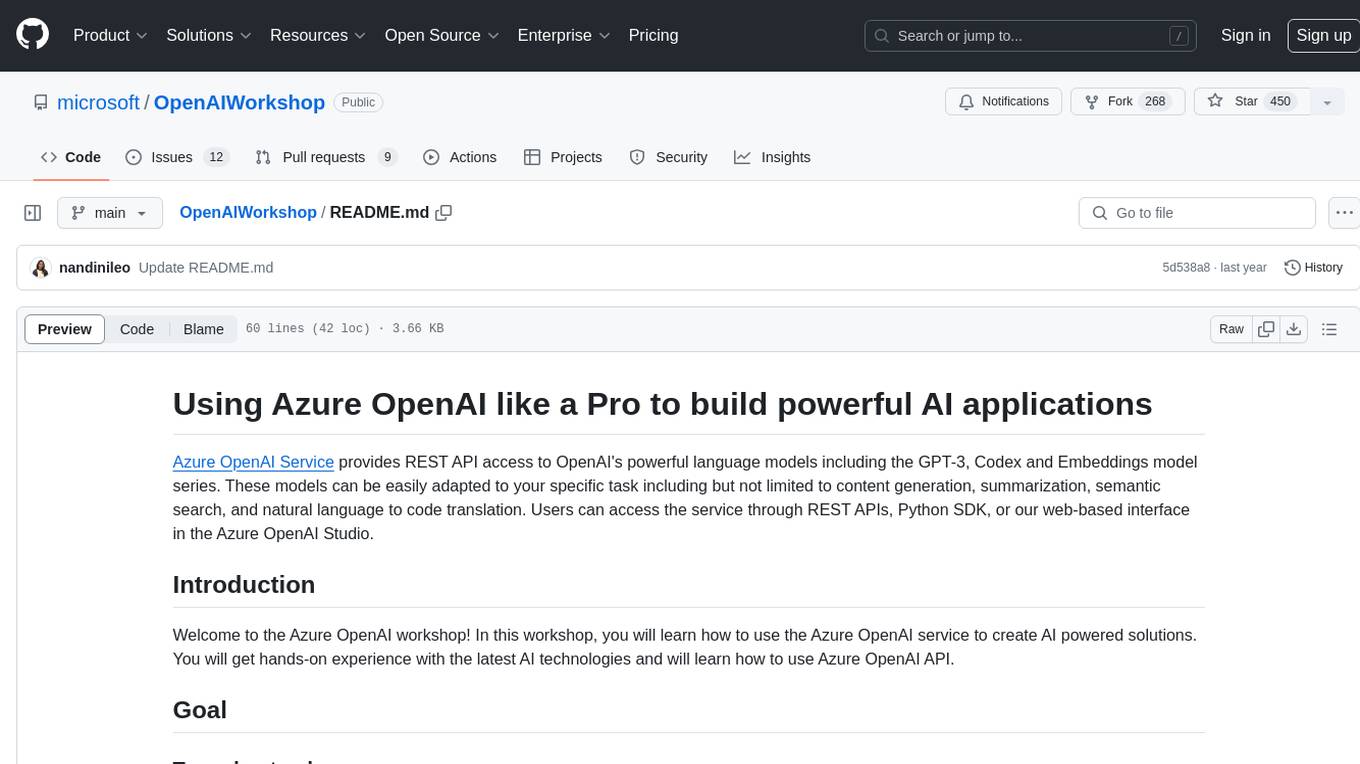
OpenAIWorkshop
Azure OpenAI Service provides REST API access to OpenAI's powerful language models including GPT-3, Codex and Embeddings. Users can easily adapt models for content generation, summarization, semantic search, and natural language to code translation. The workshop covers basics, prompt engineering, common NLP tasks, generative tasks, conversational dialog, and learning methods. It guides users to build applications with PowerApp, query SQL data, create data pipelines, and work with proprietary datasets. Target audience includes Power Users, Software Engineers, Data Scientists, and AI architects and Managers.
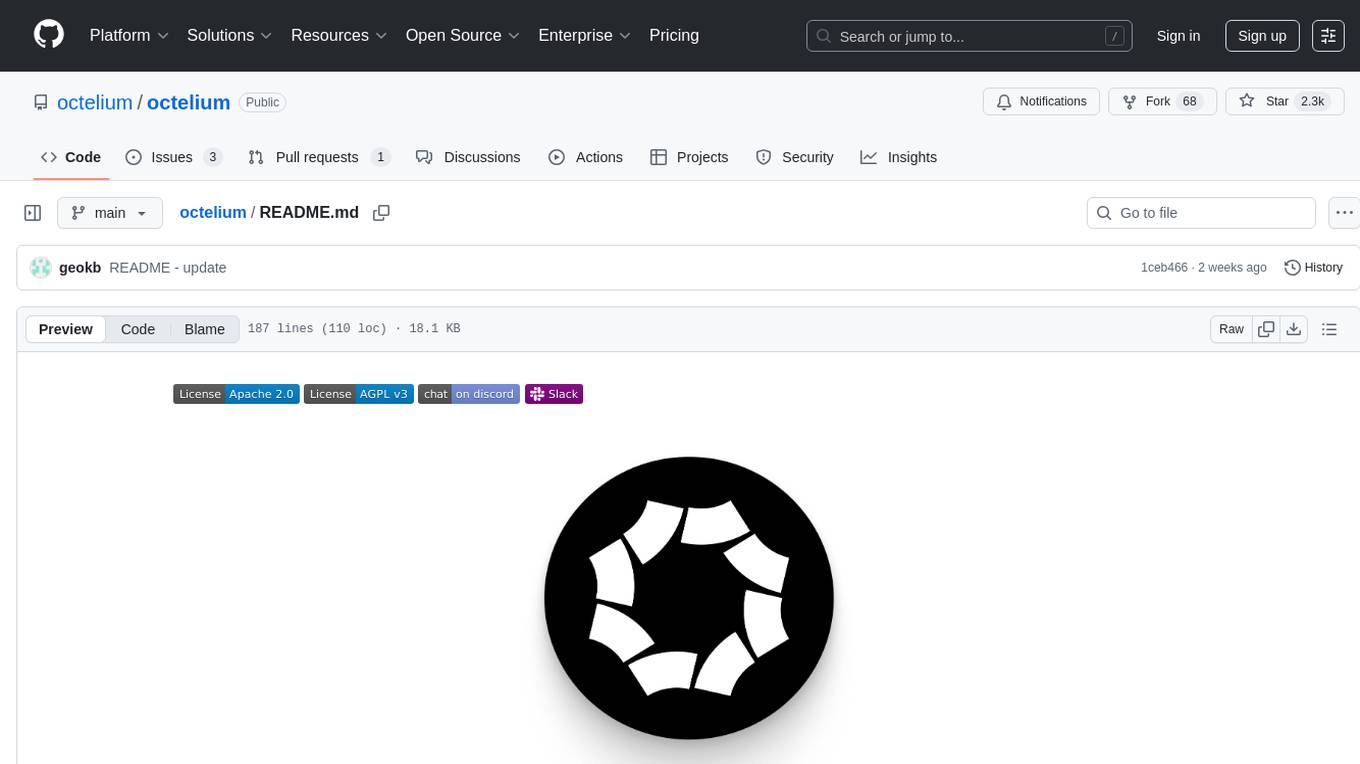
octelium
Octelium is a free and open source, self-hosted, unified zero trust secure access platform that operates as a modern zero-config remote access VPN, a comprehensive Zero Trust Network Access (ZTNA)/BeyondCorp platform, an ngrok/Cloudflare Tunnel alternative, an API gateway, an AI/LLM gateway, a PaaS-like platform, a Kubernetes gateway/ingress, and a homelab infrastructure. It provides scalable zero trust architecture for identity-based, application-layer aware secure access via private client-based access over WireGuard/QUIC tunnels and public clientless access, with context-aware access control. Octelium offers dynamic secretless access, fine-grained access control, identity-based routing, continuous strong authentication, OpenTelemetry-native auditing, passwordless SSH, effortless deployment of containerized applications, centralized management, and more. It is open source, designed for self-hosting, and provides a commercial license option for businesses.
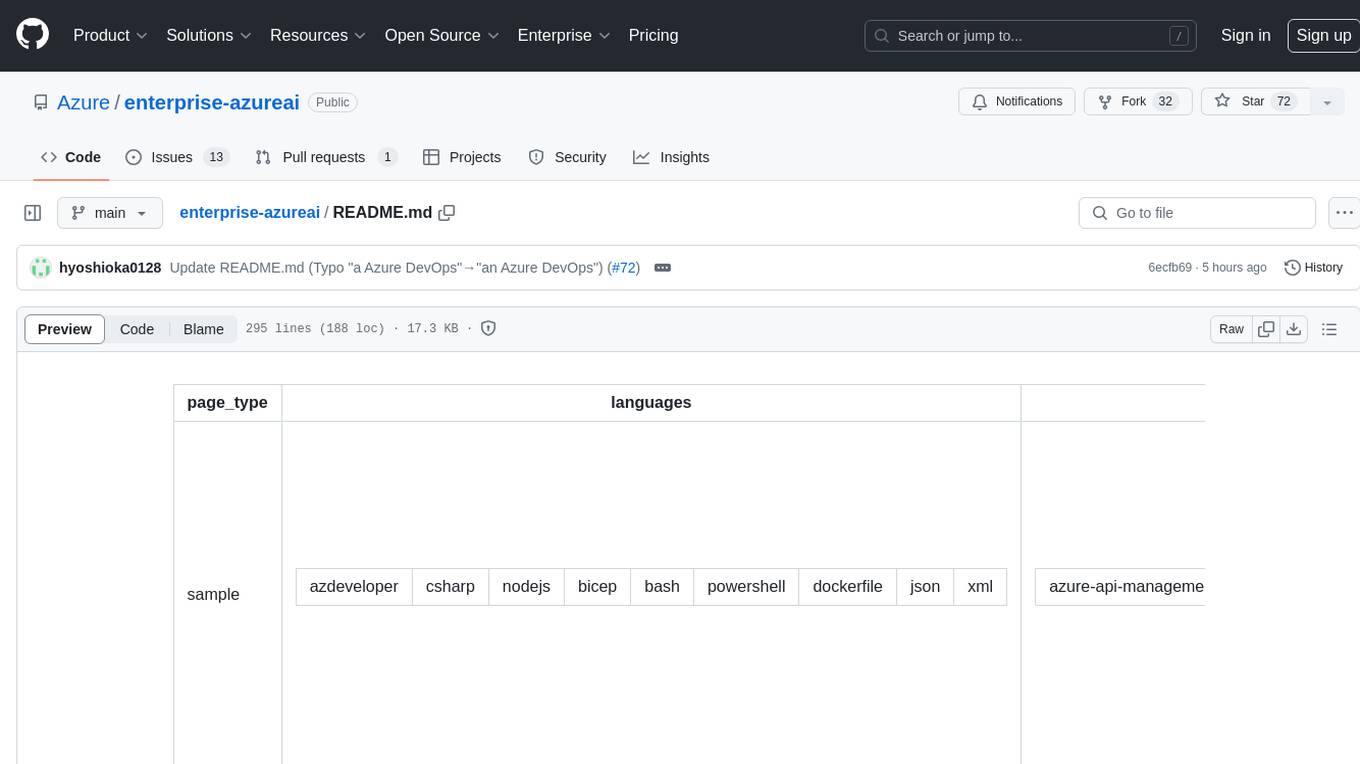
enterprise-azureai
Azure OpenAI Service is a central capability with Azure API Management, providing guidance and tools for organizations to implement Azure OpenAI in a production environment with an emphasis on cost control, secure access, and usage monitoring. It includes infrastructure-as-code templates, CI/CD pipelines, secure access management, usage monitoring, load balancing, streaming requests, and end-to-end samples like ChatApp and Azure Dashboards.
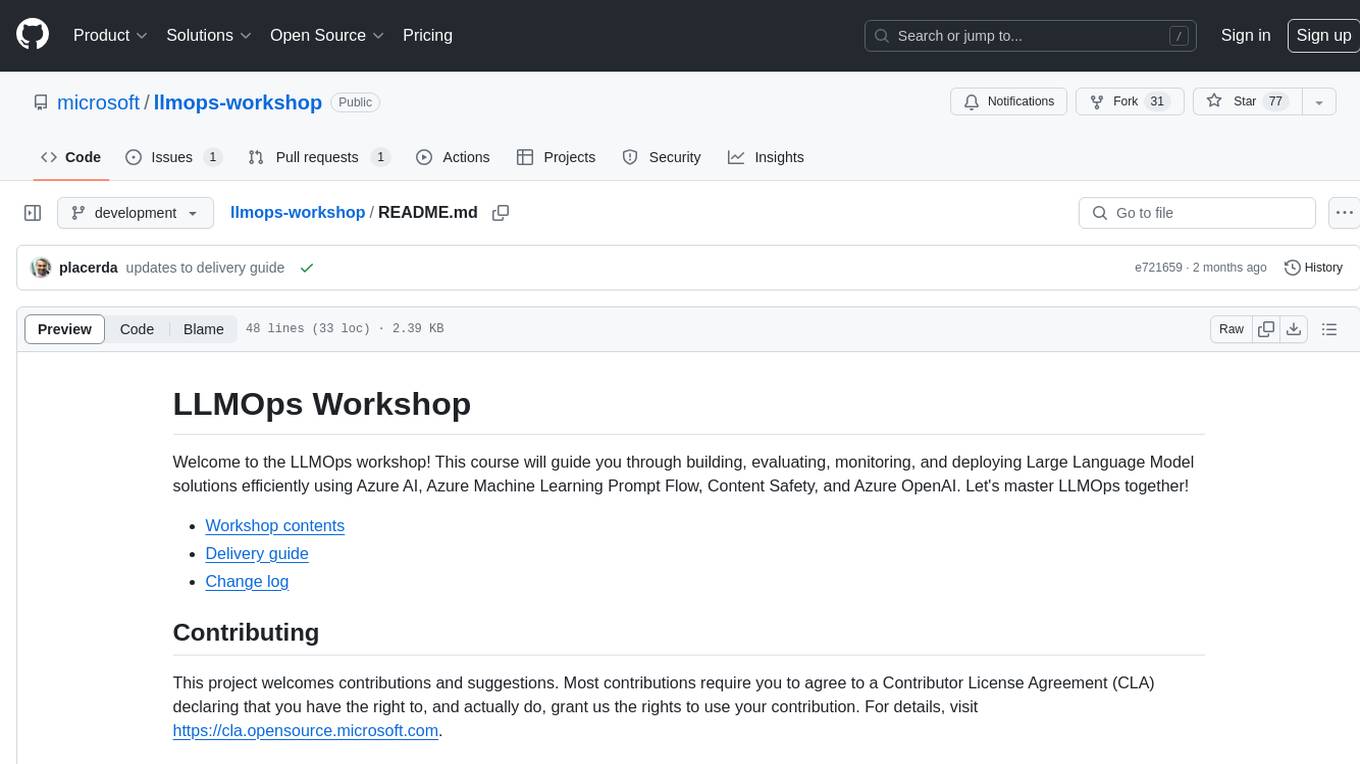
llmops-workshop
LLMOps Workshop is a course designed to help users build, evaluate, monitor, and deploy Large Language Model solutions efficiently using Azure AI, Azure Machine Learning Prompt Flow, Content Safety, and Azure OpenAI. The workshop covers various aspects of LLMOps to help users master the process.
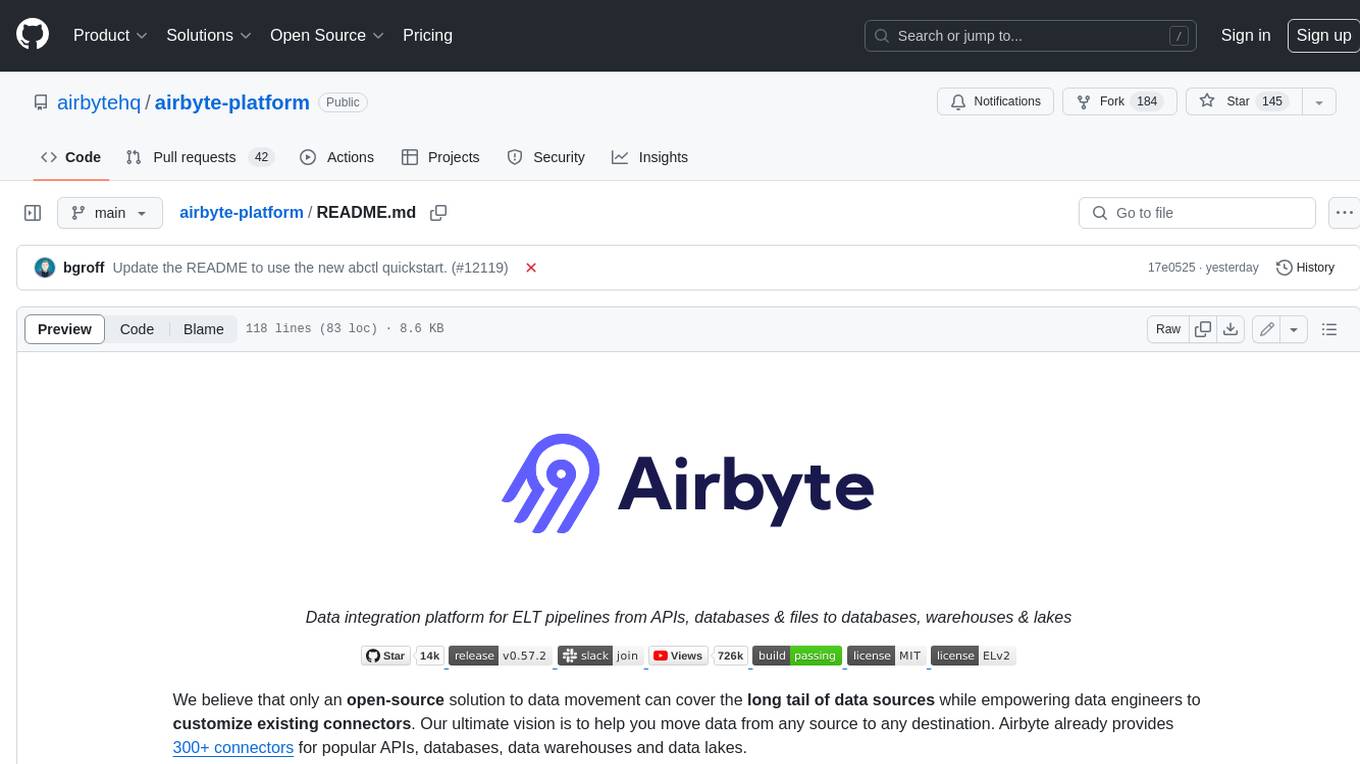
airbyte-platform
Airbyte is an open-source data integration platform that makes it easy to move data from any source to any destination. With Airbyte, you can build and manage data pipelines without writing any code. Airbyte provides a library of pre-built connectors that make it easy to connect to popular data sources and destinations. You can also create your own connectors using Airbyte's low-code Connector Development Kit (CDK). Airbyte is used by data engineers and analysts at companies of all sizes to move data for a variety of purposes, including data warehousing, data analysis, and machine learning.
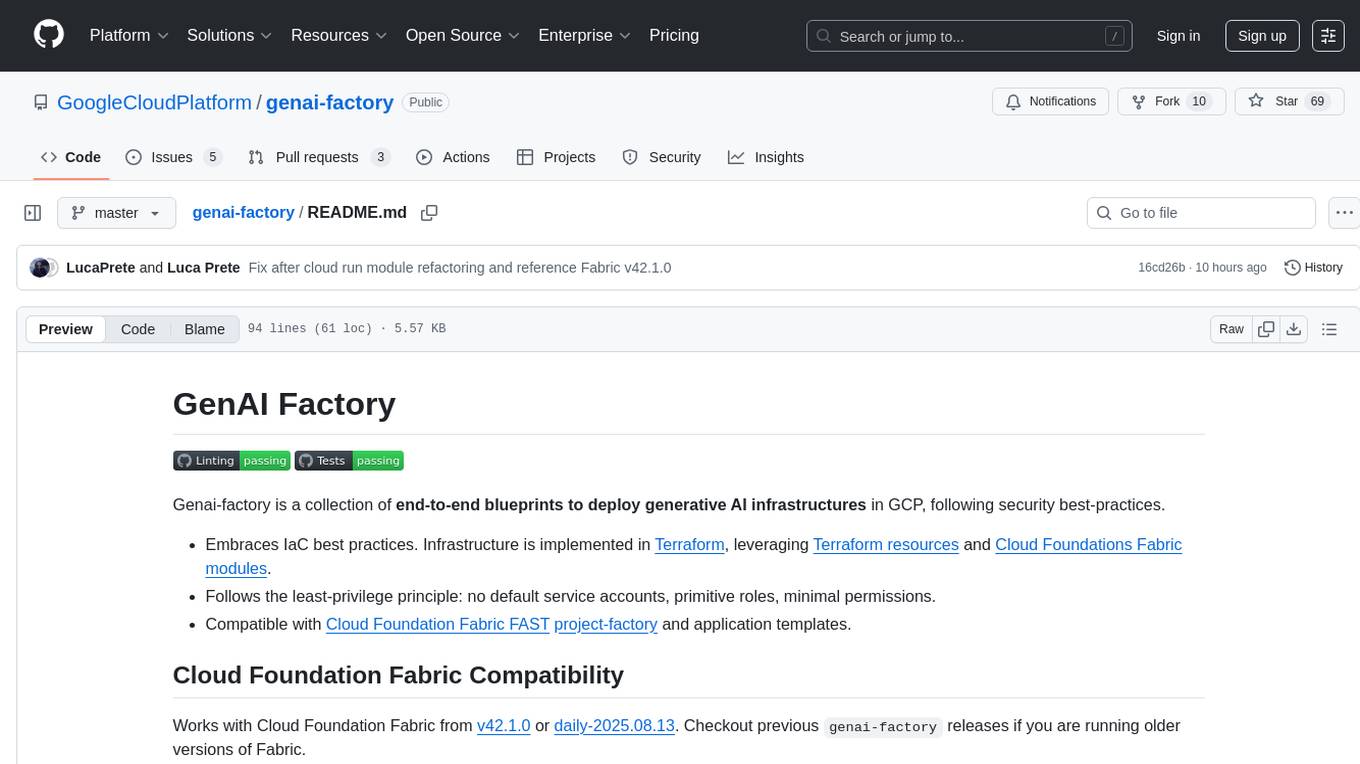
genai-factory
GenAI Factory is a collection of end-to-end blueprints to deploy generative AI infrastructures in Google Cloud Platform (GCP), following security best practices. It embraces Infrastructure as Code (IaC) best practices, implements infrastructure in Terraform, and follows the least-privilege principle. The tool is compatible with Cloud Foundation Fabric FAST project-factory and application templates, allowing users to deploy various AI applications and systems on GCP.
For similar tasks

az-hop
Azure HPC On-Demand Platform (az-hop) provides an end-to-end deployment mechanism for a base HPC infrastructure on Azure. It delivers a complete HPC cluster solution ready for users to run applications, which is easy to deploy and manage for HPC administrators. az-hop leverages various Azure building blocks and can be used as-is or easily customized and extended to meet any uncovered requirements. Industry-standard tools like Terraform, Ansible, and Packer are used to provision and configure this environment, which contains: - An HPC OnDemand Portal for all user access, remote shell access, remote visualization access, job submission, file access, and more - An Active Directory for user authentication and domain control - Open PBS or SLURM as a Job Scheduler - Dynamic resources provisioning and autoscaling is done by Azure CycleCloud pre-configured job queues and integrated health-checks to quickly avoid non-optimal nodes - A Jumpbox to provide admin access - A common shared file system for home directory and applications is delivered by Azure Netapp Files - Grafana dashboards to monitor your cluster - Remote Visualization with noVNC and GPU acceleration with VirtualGL
For similar jobs

weave
Weave is a toolkit for developing Generative AI applications, built by Weights & Biases. With Weave, you can log and debug language model inputs, outputs, and traces; build rigorous, apples-to-apples evaluations for language model use cases; and organize all the information generated across the LLM workflow, from experimentation to evaluations to production. Weave aims to bring rigor, best-practices, and composability to the inherently experimental process of developing Generative AI software, without introducing cognitive overhead.

agentcloud
AgentCloud is an open-source platform that enables companies to build and deploy private LLM chat apps, empowering teams to securely interact with their data. It comprises three main components: Agent Backend, Webapp, and Vector Proxy. To run this project locally, clone the repository, install Docker, and start the services. The project is licensed under the GNU Affero General Public License, version 3 only. Contributions and feedback are welcome from the community.

oss-fuzz-gen
This framework generates fuzz targets for real-world `C`/`C++` projects with various Large Language Models (LLM) and benchmarks them via the `OSS-Fuzz` platform. It manages to successfully leverage LLMs to generate valid fuzz targets (which generate non-zero coverage increase) for 160 C/C++ projects. The maximum line coverage increase is 29% from the existing human-written targets.

LLMStack
LLMStack is a no-code platform for building generative AI agents, workflows, and chatbots. It allows users to connect their own data, internal tools, and GPT-powered models without any coding experience. LLMStack can be deployed to the cloud or on-premise and can be accessed via HTTP API or triggered from Slack or Discord.

VisionCraft
The VisionCraft API is a free API for using over 100 different AI models. From images to sound.

kaito
Kaito is an operator that automates the AI/ML inference model deployment in a Kubernetes cluster. It manages large model files using container images, avoids tuning deployment parameters to fit GPU hardware by providing preset configurations, auto-provisions GPU nodes based on model requirements, and hosts large model images in the public Microsoft Container Registry (MCR) if the license allows. Using Kaito, the workflow of onboarding large AI inference models in Kubernetes is largely simplified.

PyRIT
PyRIT is an open access automation framework designed to empower security professionals and ML engineers to red team foundation models and their applications. It automates AI Red Teaming tasks to allow operators to focus on more complicated and time-consuming tasks and can also identify security harms such as misuse (e.g., malware generation, jailbreaking), and privacy harms (e.g., identity theft). The goal is to allow researchers to have a baseline of how well their model and entire inference pipeline is doing against different harm categories and to be able to compare that baseline to future iterations of their model. This allows them to have empirical data on how well their model is doing today, and detect any degradation of performance based on future improvements.

Azure-Analytics-and-AI-Engagement
The Azure-Analytics-and-AI-Engagement repository provides packaged Industry Scenario DREAM Demos with ARM templates (Containing a demo web application, Power BI reports, Synapse resources, AML Notebooks etc.) that can be deployed in a customer’s subscription using the CAPE tool within a matter of few hours. Partners can also deploy DREAM Demos in their own subscriptions using DPoC.